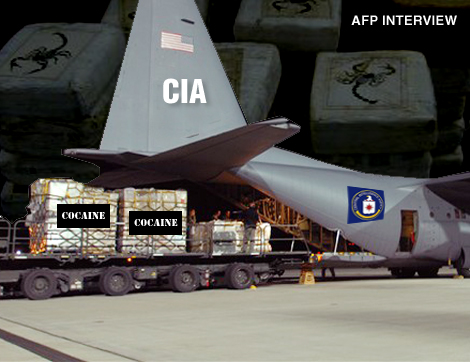
• Former DEA agent affirms Mexican claims: U.S. in bed with global dope dealers
By Keith Johnson
In late July a top Mexican government official made headlines around the world by accusing the Central Intelligence Agency (CIA) of playing a key role in facilitating the international drug smuggling trade. On July 27, AMERICAN FREE PRESS spoke with former Drug Enforcement Administration (DEA) agent Michael Levine, who said this confirms what he’s been saying for decades.
In an interview with Arab news outlet Al Jazeera, Guillermo Terrazas Villanueva, an official spokesman for the state government of Chihuahua, told reporter Chris Arsenault that the CIA and other international security forces “don’t fight drug traffickers,” but rather “try to manage the drug trade.”
According to Villanueva, the CIA operates “like pest control companies. If you finish off the pests, you are out of a job. If they finish the drug business, they finish their jobs.”
The CIA has thus far refused to directly comment on the allegations. However, Kevin Sabet, a former senior adviser to the White House on drug control policy, dismissed Villanueva’s accusations as nothing more than “conspiracy theories.” ”Statements should be backed up with evidence,” Sabet told Al Jazeera.
Apparently, Sabet has not read Levine’s New York Times bestseller, Deep Cover.
“That book gives a firsthand account of what we are talking about right now,” Levine said during a recent interview with this AFP reporter. “It tells the story of a [DEA] operation I led [in 1987] called ‘Trifecta,’ where our undercover team posed as a [U.S.] Mafia family and dealt with factions of the Mexican government to set up a 15-ton cocaine deal.”
Levine went on to describe the elaborate scheme, and the damning evidence that his team uncovered as a result.
“With the help of the Mexican military, we were to transit cocaine from Bolivia, through Mexico, into the United States,” Levine explained. “We had hidden videos of Mexican Colonel Jorge Carranza—bodyguard of incoming Mexican President Carlos Salinas de Gortari—telling me that once our deal went through, we would have an open door into the U.S. through Mexico.”
Levine continues: “We immediately sent the videos to then-Attorney General Edwin Meese. But Meese blew our cover. He called the attorney general of Mexico and warned him about us. Why? As we found out, the CIA was behind the whole thing. The people we were about to lock up were CIA assets.”
According to Levine, colluding with criminals is a standard procedure the CIA continues to practice. “You can be the biggest drug dealer in the world,” says Levine, “but if you have any political influence in your country, which most drug dealers do, the CIA will hire you.”
When asked why the U.S. government allows this criminality to go unchecked, Levine replied: “The CIA and other intelligence agencies, right down to the Partnership for a Drug Free America, have a vested interest in maintaining a global drug problem. That’s what they live for. They pretty much rely on drug proceeds to fund their operations.”
And these operations are not just confined to countries south of the border. According to Levine, “Take Afghanistan for example, where all of our [CIA] assets are tribal leaders who are allowed to traffic in heroin because they’re anti-Taliban. The CIA is supporting these people, and making sure they don’t get arrested or indicted.”
Levine went on to explain: “What the CIA’s motivation is in many cases, even going back to the Vietnam War, is to support these people because they are our allies. In the case of Vietnam, it was to fight communism. In Mexico—as I pointed out in Deep Cover—it was the North American Free Trade Agreement [NAFTA].”
At the time Levine was leading Operation Trifecta, NAFTA was on the congressional agenda. It was already a highly controversial issue among voters and would have likely not passed if Levine’s investigation had been broadcast to the American people.
“International trade agreements are much more important than the war on drugs,” said Levine. “So the choice was made to stick the powder into the brains and veins of America’s children so long as they got their trade policy passed—that was more important.”
Operation Trifecta is not the only case that exposes CIA complicity in drug trafficking. In a later book, entitled The Big White Lie, Levine detailed the CIA’s role in creating La Corporacion, the “General Motors of cocaine,” which was directly responsible for the crack cocaine epidemic in the United States.
He also exposed the CIA-sponsored paramilitary group that brought down the pro-DEA Bolivian government, as well as the story of Sonia Atala, Bolivia’s “queen of cocaine,” whom the CIA protected from prosecution as she dealt drugs to American citizens during the 1980s.
Keith Johnson in an investigative journalist and host of the Revolt of the Plebs radio program.

